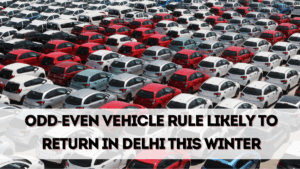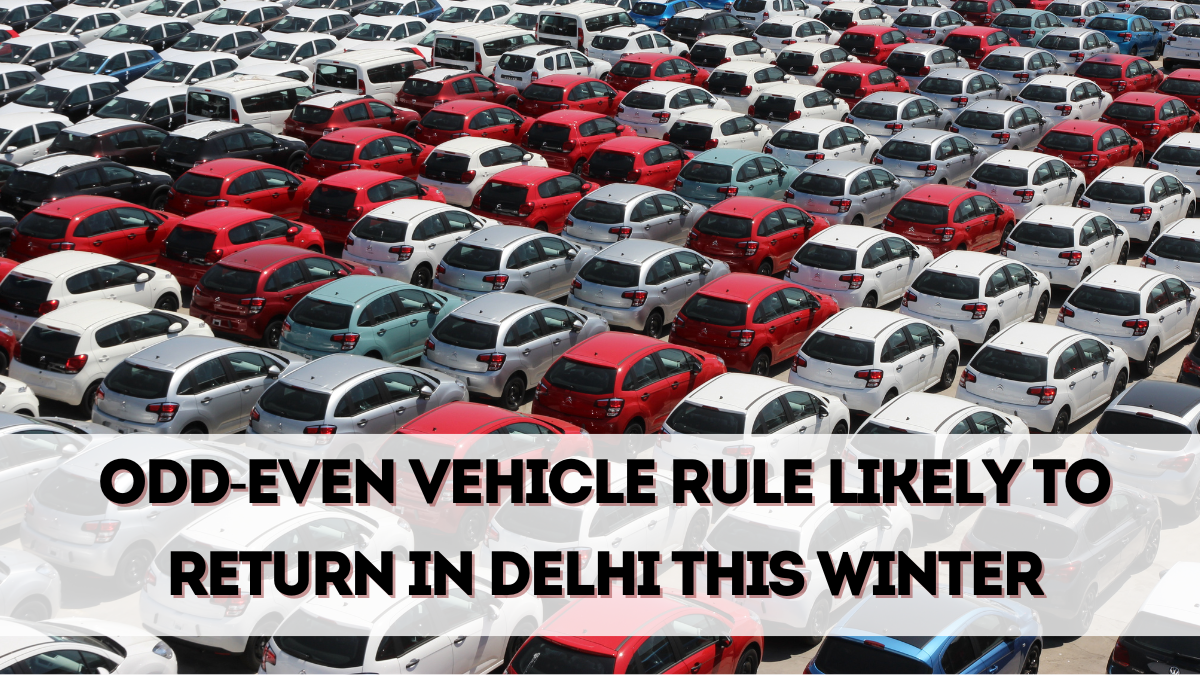The Delhi government has announced that it may reintroduce the odd-even vehicle rule in winter 2025 if pollution levels worsen.
The decision follows rising concerns over Delhi’s air quality index (AQI), which typically deteriorates during colder months due to stubble burning, weather conditions, and heavy traffic.

What Is the Odd-Even Rule?
The odd-even traffic rule is a temporary measure where vehicles are allowed on the road based on the last digit of their registration number.
-
Odd-numbered vehicles run on odd dates.
-
Even-numbered vehicles run on even dates.
The rule aims to cut down traffic and reduce vehicle emissions, which are major contributors to Delhi’s air pollution.
Why It May Return in 2025
Delhi experiences severe pollution every winter. In November and December, AQI levels often cross “severe” (400+), making the air dangerous to breathe.
The government has warned that if AQI reaches critical levels this year, the odd-even scheme will be implemented immediately to control emissions.
The rule has been used in past years during peak smog periods, showing moderate success in reducing traffic congestion and vehicular pollution.
Implementation Timeline
If triggered, the scheme is likely to run in November and December 2025, the months with the worst pollution levels.
Authorities will monitor AQI daily and announce specific dates in advance. The scheme may run for one or two weeks at a time, depending on pollution severity.
Exemptions Under the Rule
Not all vehicles will be restricted. Past implementations suggest that the following may be exempt:
-
Electric Vehicles (EVs) and CNG cars.
-
Two-wheelers, which form a majority of Delhi’s traffic.
-
Women drivers for safety reasons.
-
Emergency vehicles such as ambulances, fire trucks, and police cars.
-
School buses and government service vehicles.
Final exemptions for 2025 will be announced closer to the rollout.
Impact on Daily Commuters
The return of the odd-even scheme will directly affect millions of commuters.
Car owners may need to rely on public transport, ride-sharing, or carpooling on restricted days. Delhi Metro and bus services are expected to run at higher frequencies to handle the increased load.
For families with only one car, the scheme could cause inconvenience, but many appreciate the measure as a short-term solution to worsening pollution.
Environmental Benefits
Studies from earlier phases showed that the odd-even scheme reduced:
-
Traffic congestion by 10–15%.
-
Vehicular emissions by up to 20% during implementation days.
While the improvement was temporary, it highlighted the importance of emergency measures to tackle severe smog conditions.
Criticism of the Rule
Despite its benefits, the rule has faced criticism in the past.
-
Limited Effectiveness: Air pollution in Delhi is caused by multiple factors, including stubble burning and industrial emissions, not just cars.
-
Inconvenience: Many commuters find it difficult to adjust their routines.
-
Enforcement Issues: Monitoring millions of vehicles daily is a challenge for traffic police.
Experts argue that the rule should be paired with long-term solutions, such as promoting EVs, improving public transport, and controlling stubble burning.
Government’s Larger Plan
The odd-even rule is only one part of Delhi’s larger air pollution control strategy.
Other measures include:
-
Ban on construction activities during high AQI periods.
-
Dust suppression drives using water sprinklers.
-
Incentives for EV adoption and charging infrastructure.
-
Coordination with neighboring states to manage stubble burning.
Together, these measures aim to ensure cleaner air for Delhi residents.
What Residents Should Expect
If the rule is reintroduced in 2025, residents should prepare in advance.
-
Plan travel schedules around restricted days.
-
Consider carpooling with neighbors or colleagues.
-
Use public transport passes for convenience.
-
Stay updated on AQI alerts and government announcements.
By cooperating with the policy, citizens can contribute to reducing pollution during critical months.
FAQs
What is the odd-even rule in Delhi?
It restricts cars on alternate days based on the last digit of their registration number to reduce traffic and pollution.
When will the rule be applied in 2025?
It may return in November and December 2025, depending on air quality levels.
Who will be exempt from the rule?
EVs, two-wheelers, women drivers, emergency vehicles, and some government services are likely to be exempt.
Does the odd-even rule really reduce pollution?
Yes, but only partially. It reduces vehicular emissions temporarily, but other pollution sources remain.
Why is the rule controversial?
Many argue it causes inconvenience for commuters and offers only short-term relief from pollution.
Click here to know more.
